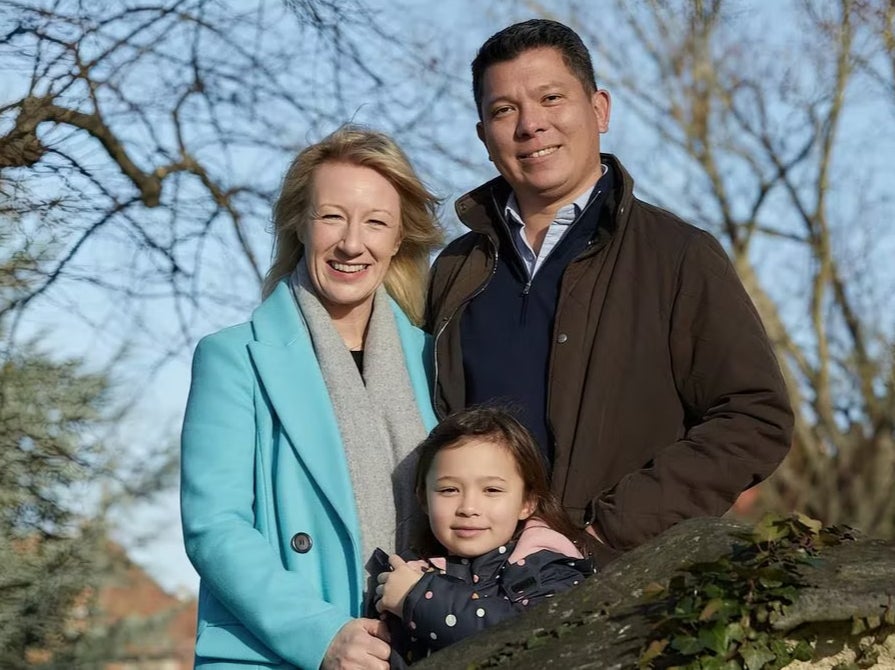Why do men kill their families?
‘We want to make ourselves believe that they just snapped’ – the truth is much more shocking. Eloise Hendy talks to criminologists and experts on domestic violence about why women and children are being murdered by their partners


Of course it was the husband,” Jamie Klingler, co-founder of the Reclaim These Streets campaign, wrote on Twitter on 7 February. “Are any of us f***ing surprised any more? And by us, I mean women.”
It has been just over two weeks since the town of Epsom – and in turn the entire UK – was plunged into horror after the murder of Epsom College headteacher Emma Pattison and her seven-year-old daughter Lettie, at the hands of husband and father George Pattison, who took his own life after the killings. As the investigation is ongoing, it would be inappropriate to speculate on the exact details of the case, or to jump to any conclusions about either George Pattison’s mental state or the state of the Pattisons’ marriage. Despite this, immediate reactions to the tragedy have been telling.
At first, the press reported only that the three family members had been found dead, without any suggestion that this was a case of family annihilation. Yet, when the true horror of the crime was revealed, many women like Klingler were quick to profess themselves shocked, but sadly not surprised.
Cases of familicide – a type of murder or murder-suicide in which one kills multiple members of one’s own family – are rare, but tend to tear through the public consciousness. It is a crime so extreme it seems unspeakable. Unthinkable. Senseless. And yet, each time news breaks that this kind of horrific violence has occurred once again, the same questions inevitably start. How could this happen? Why did he do it?
While women can of course be violent offenders, and there have been a handful of cases of familicide committed by women, the plain, devastating truth is that this is, overwhelmingly, a crime committed by men, against the women and children they are supposed to care for. One 2010 study of 408 murder-suicide cases in the United States reported 91 per cent of perpetrators were men. In typical law and order speak, police called the Epsom case an “isolated incident”, yet, clearly, it is anything but. This was emphasised in the poignant remarks made by Cheryl Giovannoni, chief executive of the Girls’ Day School Trust, after Pattison’s death. “Emma’s loss reminds us it doesn’t matter how successful or accomplished or brilliant you are as a woman,” Giovannoni said. “You are only as safe as your male partner allows you to be.”
The next wave of media response was revealing in a different way, however. Within days, tabloid headlines tipped into toxic stereotypes and victim blaming. George Pattison was “good-looking”, “polite”, “pleasant”; Emma Pattison was “ambitious”, “successful”, “menopausal”. “Did living in the shadow of his high-achieving wife lead to unthinkable tragedy,” the Daily Mail asked. This framing clearly seems to divest responsibility from George Pattison, laying blame at the feet of his spouse and victim. Yet, while the tabloid press’s victim-blaming instinct also led women online to declare themselves shocked but unsurprised, there is an undeniably tricky element to cases so saturated in misogynistic savagery.
For how can you begin to unravel the psychology of violent and vengeful men – men who unburden themselves of all responsibility and lay all blame on those closest to them – without falling into the trap of parroting their “reasoning”? How can you get to grips with what might lead to family annihilation without deconstructing how the perpetrator saw his role in the family? The same questions remain. What drives a man to commit such an unspeakable act? And, perhaps even more urgently, why do cases of this kind seem to be increasing?
David Wilson is professor emeritus of criminology and the founding director of the Centre for Applied Criminology at Birmingham City University. “Some of the headlines I saw were verging towards victim blaming,” he says of the media aftermath of the Epsom case. “But at the same time, you’ve got to understand the dynamic within that family unit,” he stresses. “If you don’t understand the dynamic within the family unit, then it becomes impossible to actually deconstruct the most dreadful of crimes, which is that this is a man who’s killed his partner and killed his child. You do have a responsibility to explain why this has happened.”
In 2013, Professor Wilson co-authored a hugely influential study on familicide, alongside professor of criminology Elizabeth Yardley and Dr Adam Lynes, a senior lecturer in criminology. They analysed newspaper articles from 1980 to 2012 where cases of familicide were reported, and found a total of 71 cases, where 59 of the perpetrators were male and more than half were between the ages of 30 and 40 when they committed the crime. One of the things Professor Wilson noted of the male perpetrators he studied was the intensity of the violence they used. “Men use much more dramatic forms of family annihilation,” he declares. “There was definitely a performative nature of the violence they would use.” This would often manifest in the male perpetrator telling people about their planned crimes. “They wanted to be seen to have done this,” Wilson indicates, “they would often leave notes, they would often talk to people, and say that they were going to do this.” The worst example of this that he came across in his research “was a man who drove his car into a river – his two children were in the back and one child was phoning his mother [to tell her] what was happening.”
I think what we’re seeing is just how deeply misogyny and misogynistic views are in our culture. That’s what we’re seeing an uptick of
In their study, Wilson, Yardley and Lynes theorised that it was possible to discern four different types of family annihilator. They dubbed these groups anomic, disappointed, self-righteous, and paranoid killers. “When we did this research,” Professor Wilson says, “it had been a binary category that had been set up. And in fact, the killers were called ‘altruistic’ killers. We called them anomic,” – meaning alienated, purposeless, or socially disoriented. “We were saying that’s not ‘altruistic’, this is absurd, we’re buying into the explanation of the man. It wasn’t altruism.”
“These men often were holding down good jobs, professional jobs,” Wilson says of the male perpetrators he studied, indicating a “significant number” were from military or policing backgrounds. Of the 59 family annihilators considered, “there was quite clearly a group of men who were being made redundant, or bankrupt, or financially were in all kinds of problems,” he notes. This is where the term “anomic” emerged from. “They saw their family as an extension of their economic success,” Professor Wilson explains, “and their family was therefore an extension of their economic failure.” Mass murder was, then, seen as a way of avoiding the consequences of being made bankrupt or redundant. “They simply saw their family as a possession that they then could destroy,” Professor Wilson declares. “By destroying their family, by taking their own life, it prevented a judgement on them taking place.”

Although this psychological “reasoning” seemed prevalent, the most common “type” the researchers uncovered was the self-righteous. “The self-righteous family annihilator blamed his spouse, everything that was happening – in terms of the family, in terms of his life, his feelings about his life – everything became focused on ‘it’s the woman’s fault’.
“The key thing to grasp, which many people misunderstand, is that these men were not just snapping,” Professor Wilson stresses. “These men were planning this over a long period of time, and the execution of the plan had a performative element, but would often be very carefully constructed.” “We want to make ourselves believe that they just snapped,” he suggests, “because it’s somehow easier, psychologically, to accommodate in terms of our sense of what seems senseless.” But he had to confront that “it wasn’t like that at all. It was very carefully planned.”
“The Epsom case was clearly planned for a long period of time,” Professor Wilson suggests. He cites the fact that there was reportedly “lots of tension within the family, to the extent that the police had in the past been called” and refers to the interview Emma Pattison gave to the school, just weeks before her murder. “I think she said ‘my husband had to get a new job, he wasn’t expecting to,’” Professor Wilson notes, and suggests George Pattison “would have been self-righteous about that.” Indeed, he says it seems clear to him that, in the Epsom case, “we have someone that was being self-righteous: ‘This is you. I’m blaming you. It’s your fault’.”
Dr Neil Websdale is the director of the Family Violence Institute at Arizona State University, and the author of Familicidal Hearts: The Emotional Styles of 211 Killers. He draws a spectrum between what he dubs “livid coercive” and “civil reputable” killers. The first “type”, in his view, has a more visible history of violence. “In these cases, familicide comprises the end point in a violent, sometimes tyrannical relationship,” Websdale suggests. What he refers to as “civil reputable” killers, on the other hand, would appear to the outside world as “quiet, subdued, respectable, upstanding citizens”, who nevertheless commit an atrocious act of violence.
Closely echoing Professor Wilson’s notions about anomic and disappointed killers, Websdale suggests “these perpetrators killed because their lives were spinning out of control and they perceived they faced the threat of bankruptcy, destitution, familial dissolution or some other calamity.” Yet, he also professes that this may be a uniting factor across all kinds of family annihilation. “The most important and consistent theme among the familicide cases is the presence of intense shame in the lives of perpetrators, much of it unacknowledged, bypassed, or dangerously repressed.” For most perpetrators, Websdale concludes, “shame stems in large part from their sense they have failed to live up to dominant ideas about masculinity.”

Rather than an unexplainable crime that sits totally outside our realms of comprehension then, it seems familicide is intimately entwined with the broader crisis of patriarchal misogyny. It has its roots not only in domestic violence, but in everyday gendered assumptions about women and men’s roles in society and, especially, a warped and dangerous vision of what strong, successful masculinity looks like.
Ruth Davison, CEO of Refuge, calls attention to the fact that “two women are killed every week in England and Wales by their current or former partners”. “Frequently,” she adds, “these murders have been premeditated and follow a pattern of violence and abuse that terrorise the victim.” Davison emphasises that “there isn’t one ethnic, age or social class group that is more at risk, and many of these cases never make national headlines”. Despite common police parlance, Davison also stresses “these are not isolated incidents. We know domestic abuse is a gendered crime, rooted in misogyny.” Tragically, she notes, “women are most at risk of homicide when they leave or attempt to leave their abusive partner.” Or, as Cheryl Giovannoni said less than a fortnight ago, “you are only as safe as your male partner allows you to be.”
“Really, what we were dealing with,” Professor Wilson says, “is a performance of masculinity that was – as they would have seen it – ‘traditional’, and how all of their masculinity became invested in their relationship, and their children will become seen as simply other forms of possession.” One thing Professor Wilson has noticed is that, while the violence perpetrated against women and children has always been appalling, “it’s got even worse since Covid.” “When I first started out in the world that I inhabit as a criminologist,” he says, “I came across one case of decapitation in my career, and now I encounter cases of decapitation and mutilation all the time.”
“I think what we’re dealing with is just misogyny,” Professor Wilson attests. “I think what we’re seeing is just how deeply misogyny and misogynistic views are in our culture. That’s what we’re seeing an uptick of.” He points to social media influencer and former kickboxer Andrew Tate, who was recently arrested for alleged rape and human trafficking offences, but says the debate around Tate’s misogyny annoys him, because it reduces the issue to one man’s actions and views. “We’ve had misogynistic Andrew Tates for as long as I’ve been alive,” Wilson says. He is now in his sixties, and believes we have still “never actually tackled the circumstances that produce Andrew Tate.” This then, is the ultimate damning truth about why men kill their families. As Professor Wilson puts it, “we have a society that has never wanted to acknowledge how misogynistic it actually is.”
Refuge can support women with safety planning and provide free and confidential support via Refuge’s 24-hour National Domestic Abuse Helpline on 0808 2000 247 and digital support via live chat Monday-Friday 3-10pm via www.nationaldahelpline.org.uk



Bookmark popover
Removed from bookmarks